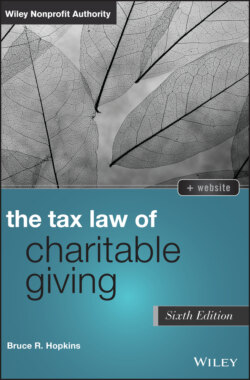Читать книгу The Tax Law of Charitable Giving - Bruce Hopkins R., Bruce R. Hopkins, David Middlebrook - Страница 60
§ 2.8 GRANTOR TRUST LAW
ОглавлениеSeveral instances of the federal tax law concerning charitable giving require application of the grantor trust rules. These rules apply with respect to grantors and others who are treated as substantial owners of the property in the trust for tax purposes—that is, those persons who have retained substantial dominion and control over the trust.611 The rules tax to the grantor the income of the grantor trust; technically, the income of the trust (along with appropriate tax deductions612 and tax credits) is attributed to the grantor.613 A grantor is a person (including a corporation614) who transfers property to a trust.615
There are five circumstances in which a grantor is regarded as an owner of some portion of a trust and thus is taxed on the income of the trust:616
1 A grantor is treated as the owner of any portion of a trust in which they have a reversionary interest in either the corpus of or the income from the trust if, as of the inception of that portion of the trust, the value of the interest exceeds 5 percent of the value of the portion.617
2 A grantor is treated as the owner of any portion of a trust in respect of which the beneficial enjoyment of the corpus or the income from it is subject to a power of disposition, exercisable by the grantor or a nonadverse party, or both, without the approval or consent of any adverse party.618 This general rule does not apply, however, to a power to determine the beneficial enjoyment of the corpus or of the income from it if the corpus or income is irrevocably payable for a charitable purpose.619 The power to choose between charitable beneficiaries or to affect the manner of their enjoyment of a beneficial interest does not cause the grantor to be treated as an owner of a portion of the trust.620
3 A grantor is treated as the owner of any portion of a trust when certain administrative powers over the trust exist and the grantor can or does benefit under these powers.621 These powers are the power to deal for less than adequate and full consideration, the power to borrow without adequate interest or security, the power to borrow trust funds, and a general power of administration.
4 A grantor is treated as the owner of any portion of a trust if the grantor or a nonadverse party622 has the power to revoke the trust or return the corpus to the grantor.623
5 A grantor is treated as the owner of any portion of a trust if the grantor or a nonadverse party has the power to distribute income to or for the benefit of the grantor or his or her spouse.624
In some instances, a person other than a grantor is treated as a substantial owner of a portion of a trust.625 These rules also may apply with respect to foreign trusts having one or more U.S. beneficiaries.626
